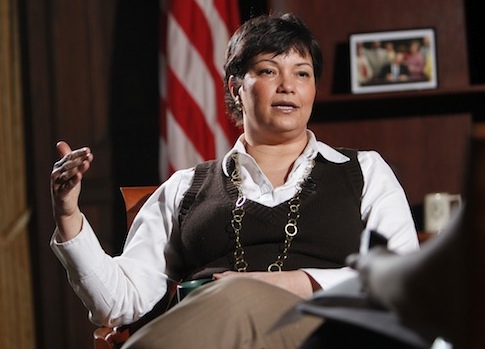The House Energy and Commerce Committee is pressuring the Environmental Protection Agency for answers on the use of secret email addresses by agency administrator Lisa Jackson and other top EPA officials.
Energy and Commerce Committee Chairman Fred Upton (R., Mich.) and Oversight and Investigations Subcommittee Chairman Cliff Stearns (R., Fla.) requested more information on the practice in a letter sent Thursday.
"In recent weeks, questions have been raised in Congress and among public interest groups about the use of one or more secondary email accounts and aliases by you and potentially other officials at the Environmental Protection Agency (EPA)," the lawmakers wrote. "Given your reported use of at least one alias email account in your conduct of agency business, we write to ask that you describe fully the nature and extent of this practice."
Republican legislators and government watchdogs fear Jackson is conducting official business through secret email addresses to skirt public disclosure under the Freedom of Information Act.
The Republican-led committee seeks to know "whether conducting business with an alias has in any way affected the transparency of the agency’s activities or the quality or completeness of information provided to the Committee."
The Energy and Commerce Committee is the second House committee to press the EPA for answers on Jackson’s use of secret emails.
The House Science Committee also sent a letter to Jackson and several inspector general offices demanding more information on the email accounts, as previously reported by the Free Beacon.
The liberal Citizens for Responsibility and Ethics in Washington has also called for an investigation into the EPA’s use of secret email addresses.
The Competitive Enterprise Institute (CEI), a nonprofit think tank, first charged Jackson with using secret email addresses to avoid disclosure under the Freedom of Information Act.
CEI senior fellow and attorney Chris Horner claims Jackson used the alias "Richard Windsor" to conduct official business. The Daily Caller reported that it had found extensive email threads between EPA officials including "Richard Windsor," who does not appear on any EPA staff lists.
Horner and CEI are currently suing the EPA, seeking to force disclosure of the alleged secret email addresses.
"I've encountered every trick known to the bureaucracy, but this, as we have informed them, represents a new low in delay tactics," said Horner, author of The Liberal War on Transparency. "They're obviously desperate to kick the inevitable revelations down the road past some point, one I presume relates to finalizing their backdoor cap-and-trade."
Horner said the EPA admitted last week through the Department of Justice that 12,000 emails related to the EPA’s coal policies exist on Jackson’s secondary email account.
The EPA has said multiple email addresses are a longstanding practice and are included in FOIA disclosures.
"For more than a decade, EPA administrators have been assigned two official, government-issued email accounts: A public account and an internal account," an EPA spokesperson previously said to the Free Beacon in an email.
"The email address for the public account is posted on EPA’s website and is used by hundreds of thousands of Americans to send messages to the administrator. The internal account is an everyday, working email account of the administrator to communicate with staff and other government officials.
"Given the large volume of emails sent to the public account—more than 1.5 million in fiscal year 2012, for instance—the internal email account is necessary for effective management and communication between the administrator and agency colleagues," the spokesperson added.
"In the case of Freedom of Information Act (FOIA) requests, both the public and internal accounts are reviewed for responsive records, and responsive records from both accounts are provided to FOIA requesters."
